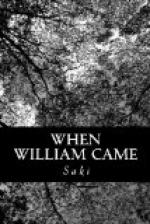Lady Bailquist said nothing, but her restless watchful eyes were turned first to Hyde Park Corner and then in the direction of the Marble Arch, back again to Hyde Park Corner. Only the dark lines of the waiting crowd met her view, with the yellow newspaper placards flitting in and out, announcing to an indifferent public the fate of Essex wickets. As far as her searching eyes could travel the green stretch of tree and sward remained unbroken, save by casual loiterers. No small brown columns appeared, no drum beat came throbbing up from the distance. The little flags pegged out to mark the positions of the awaited scout-corps fluttered in meaningless isolation on the empty parade ground.
His Majesty was talking unconcernedly with one of his officers, the foreign attaches looked steadily between their chargers’ ears, as though nothing in particular was hanging in the balance, the Abyssinian Envoy displayed an untroubled serenity which was probably genuine. Elsewhere among the Suite was a perceptible fidget, the more obvious because it was elaborately cloaked. Among the privileged onlookers drawn up near the saluting point the fidgeting was more unrestrained.
“Six minutes past three, and not a sign of them!” exclaimed Joan Mardle, with the explosive articulation of one who cannot any longer hold back a truth.
“Hark!” said some one; “I hear trumpets!”
There was an instant concentration of listening, a straining of eyes.
It was only the toot of a passing motorcar. Even Sir Leonard Pitherby, with the eye of faith, could not locate as much as a cloud of dust on the Park horizon.
And now another sound was heard, a sound difficult to define, without beginning, without dimension; the growing murmur of a crowd waking to a slowly dawning sensation.
“I wish the band would strike up an air,” said the Grafin von Tolb fretfully; “it is stupid waiting here in silence.”
Joan fingered her watch, but she made no further remark; she realised that no amount of malicious comment could be so dramatically effective now as the slow slipping away of the intolerable seconds.
The murmur from the crowd grew in volume. Some satirical wit started whistling an imitation of an advancing fife and drum band; others took it up and the air resounded with the shrill music of a phantom army on the march. The mock throbbing of drum and squealing of fife rose and fell above the packed masses of spectators, but no answering echo came from beyond the distant trees. Like mushrooms in the night a muster of uniformed police and plain clothes detectives sprang into evidence on all sides; whatever happened there must be no disloyal demonstration. The whistlers and mockers were pointedly invited to keep silence, and one or two addresses were taken. Under the trees, well at the back of the crowd, a young man stood watching the long stretch of road along which the Scouts should come. Something had




